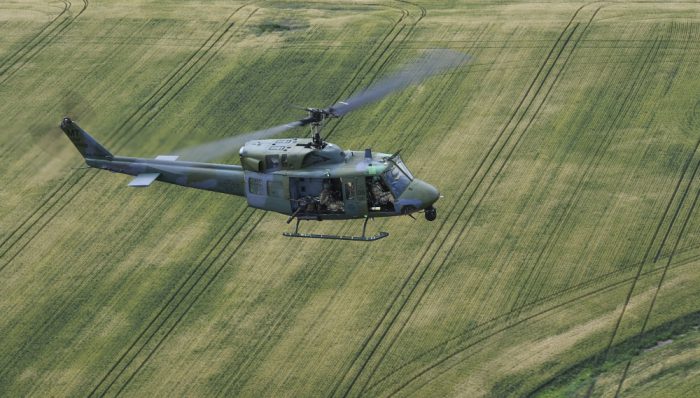
Sea state
The Chinese government refused a port call request by USS Wasp in Hong Kong amid escalating tension between the two countries. The decision follows the cancellation of two high-level trade and military meetings between Washington and Beijing and the announcement of US sanctions on the Chinese military for purchasing Russian weapons. China rejected a similar request by a US carrier strike group in 2016 during elevated tensions in the South China Sea.
Canadian frigate HCMS Calgary visited Da Nang, Vietnam last week. The ship is on a six-month mission, codenamed Operation Projection, to strengthen bilateral military ties through joint exercises and goodwill visits in the Indo-Pacific. The ship will travel to seven other ports, including Darwin as well as Yokosuka and Yokohama in Japan, Jeju and Busan in South Korea, and Guam and Pearl Harbor before returning home.
The Philippines will spend US$25 million on an amphibious aircraft, which will be used by the navy to conduct maritime surveillance and search-and-rescue operations. The acquisition would be part of the Philippine armed forces’ second phase of modernisation. Earlier this month, the Philippine navy made its first-ever port call in Russia.
Flight path
Boeing has won the competition to replace the Vietnam-era US Air Force ‘Huey’ helicopters which help protect the US nuclear missile arsenal. Boeing was awarded an initial contract worth US$375 million for four MH-139 helicopters as part of a total US$2.4 billion contract for up to 84 helicopters, associated training, support and equipment. Boeing’s offer beat competitors Sikorsky and Sierra Nevada Corp, though there is some debate as to why. The contract’s value is still significantly lower than the expected cost of US$4.1 billion.
The Polish Air Force has reportedly lifted the grounding order on its Sukhoi Su-22s. The grounding was prompted by a MiG-29 crash on 6 July in which a pilot died. The same ejector seat is used in both the Sukhoi Su-22 and the MiG-29 models. While the Su-22 resumed flights on the 25 September the MiG-29s remain grounded.
Exercise Bersama Lima 2018 began today with Australia, Singapore, Malaysia, New Zealand and the United Kingdom participating. The Royal Australian Air Force has sent 13 aircraft, including nine F/A-18 Hornets, and the army and navy are also contributing forces. The exercise runs until 19 October in the South China Sea and is part of the Five Power Defence Arrangements, signed in 1971. It tests naval, land and air power and improves cooperation and knowledge between FPDA members. Another exercise in the series, Bersama Shield, was held in April and May.
Rapid fire
Poland is poised to acquire the Patriot missile system after securing a contract worth US$1.5 billion with US-based Raytheon. The deal would require Raytheon to provide four Patriot air and missile defence systems, which will be integrated with NATO’s systems to protect Europe against attacks from ballistic and cruise missiles, advanced aircraft and unmanned aerial vehicles. This agreement follows a US–Poland deal for the acquisition of the Patriot system in March 2018.
The US Marines are using a humanoid robot to improve marksmanship skills. The wheeled robots can move at 17 kilometres per hour on uneven surfaces and can manoeuvre on rough terrain in sync with other robots. They’re also able to charge at Marines and can bounce back after being shot multiple times.
A Chinese-born student who served in the US Army Reserve has been charged with spying for China. Ji Chaoqun, who studied in the US from 2013, is accused of providing sensitive information as well as recruiting spies on behalf of China’s Ministry of State Security. He joined the reserve under a special program which allows foreign nationals with specialised skills to be recruited to the US military.
Zero gravity
An event on the sidelines of the UN General Assembly, Space2030: Space as a Driver for Peace, gathered high-level officials, academics and industry leaders to discuss space diplomacy as a new driver for peaceful collaboration between countries. Speakers raised non-traditional uses for space technology, the necessity of public-private engagement and importance of peaceful exploration for the benefit of humanity.
The Australian Space Agency and Airbus Defence and Space—a Europe-based aerospace manufacturing giant—have signed a ‘statement of strategic intent’ to develop Australia’s space industry. The partnership aims to support Australia’s developments in space discovery and technology, and highlight growth opportunities in the sector. Airbus is the Australian Space Agency’s first industry partner and the deal marks a step for the new agency into the world’s space economy, which has an estimated value of US$345 billion.
India and Morocco have signed memoranda of understanding on cooperation in ‘peaceful uses of outer space’ and cybersecurity. Strengthening their strategic partnership, which started in 2015, the two countries are diversifying engagements in space and non-traditional defence sectors.
Wired watchtower
Canada won’t be banning Chinese telecommunications giant Huawei from its 5G network, with its top cybersecurity official saying it trusts its standards to safeguard against any potential data breaches. Canada’s statement comes amid reported US pressure on its Five Eyes intelligence-sharing allies including New Zealand, Canada and the United Kingdom, to join it and Australia in banning Huawei because of a law that makes it mandatory for Chinese companies to assist in Beijing’s intelligence-gathering work.
African countries need to start thinking more seriously about cybersecurity, according to IT security company Fortinet. The continent’s small- and medium-sized enterprises are undergoing a digital transformation that has made them a major target for cyberattacks, something many firms aren’t yet able to defend against.
The Organization of American States (OAS) has released a report which gives a bleak outlook on Latin America and the Caribbean’s banking cybersecurity posture. According to the report, at least 90% of banks have suffered cyber incidents over the past year and 37% of banks were victims of successful attacks. Secretary General Luis Leonardo Almagro Lemes said security of citizens and entities in the cyber domain is an OAS priority and that the latest findings offer a tool to improve cyber defences.

